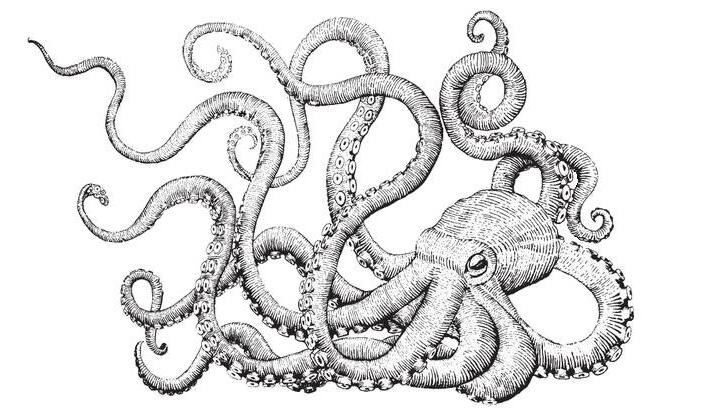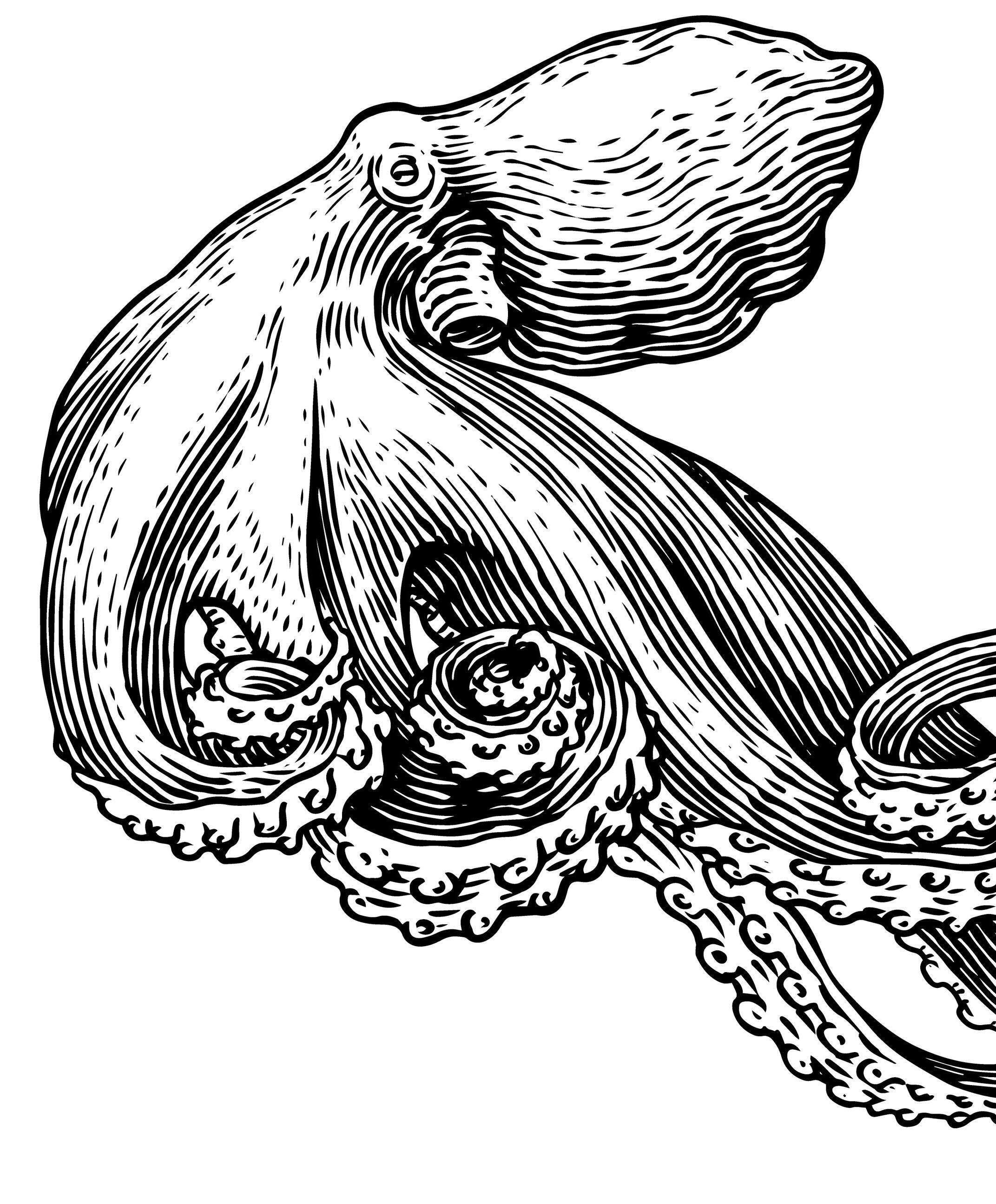





The Emerson Review is an annual literary journal by undergraduate students at Emerson College in Boston, Massachusetts.
All genres of original, unpublished writing and visual art are considered for publication.
The reading period for the 2025 issue ran from August 1st through February 1st. All submissions are handled anonymously. Materials can be submitted to The Emerson Review through our online submission manager, http://emersonreview.submittable.com. Complete guidelines can be found on our website.
General questions and comments should be sent to submissions.er@gmail.com. https://websites.emerson.edu/emerson-review
Cover Design by Melody Rivas.
Design by Melody Rivas and Liz Gómez.
Printed by Flagship Press. ©2025 The Emerson Review
Editor-in-Chief
Nina Powers (Fall 2024)
Lily Labella (Spring 2025)
Managing Editor
Anna Carson (Fall 2024)
Natalie Sparks (Spring 2025)
Assistant Managing Editor
Lily Labella (Fall 2024)
Alyssa Laze (Spring 2025)
Head Production Editor & Head Copy Editor
Ella Maoz
Assistant Production Editor & Assistant Head Copy Editor
Kyndle Fuller
Copy Editors
Olivia Trzaski
Nina Serafini
Rebecca Kim
Laurie Hilburn
Melina Gardiner
Web Editor
Arienne Dinh (Spring 2025)
Fiction Editors
Daisy Macdonald (Fall 2024)
Tessa Donohue
Roni Moser
Poetry Editors
Clara Allison
Annalisa Hansford
Ocean Muir
Nonfiction Editors
Kira Salter-Gurau
Bronwyn Terry
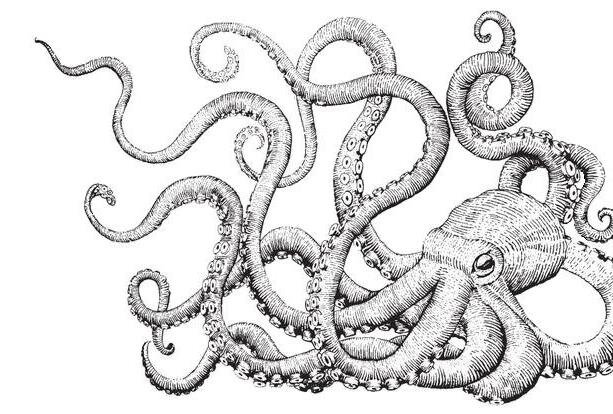
Head Production Designer
Liz Gómez
Cover Design
Melody Rivas
Social Media Manager
Andy Ambrose (Fall 2024)
Arienne Dinh (Spring 2025)
Consultants
Joe Durand
Arushi Jacob
Faculty Advisor
Amber Lee
Staff Readers
Jenna Benson
Alyssa Clark
Tessa Donohue
Kyndle Fuller
Elyse Gobbi
Aili Hedgepeth
Clara Johnk
Alyssa Laze
Ella Maoz
Madison McMahon
Ella Miller
Emma Shepherd
Paige Tokay
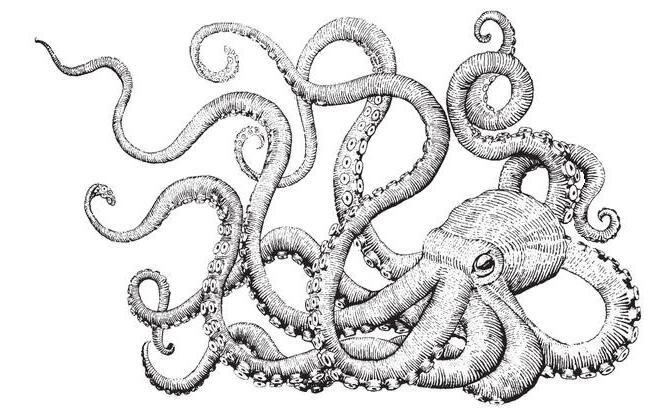
The Short Story Project is an online platform dedicated to celebrating the art of the short story. Featuring a curated collection of exceptional narratives, the website allows readers to explore stories from a variety of languages, genres, and cultures, offering both contemporary pieces and timeless classics. Each story is carefully chosen to provoke thought, challenge perspectives, and spark curiosity, ensuring an enriching reading experience.
The fifty-fourth edition of The Emerson Review is thrilled to collaborate with The Short Story Project by publishing three of our selected fiction pieces on the Project’s website. We are proud to contribute to this platform that honors the power and diversity of short stories, fostering a deeper appreciation for storytelling that transcends borders and connects us all.



I was seized by a sadness. I thought of roads as memories, as dawns rising out of exile. — Romeo Oriogun
Once, my father held a map to my face & like an old quilt
Singing of every thread woven into it, he said: Biafra was a chosen race. & even in every varying night, everything cuts us deep. Even in war, we cherished the idea of the stars being anagrams for a race
Scattered & solemn. There was a time I didn’t know of language, & I would Have sworn that bullet scars were nothing but hieroglyphics of a race.
Around me are multitudes of my brothers that can’t go outside Because the memory mocks them like ancestral masks—sworn race
Etched in blood & sand. Do you not know that even a people loved by God Still want to be free of Him? This was the sad tale of the Biafran race.
Sometimes, I wish to go back in time to the great proscenium— To reenact the labyrinths of the past & say: Here, a wishbone for your race.
A man sat between two villages & played his bones to the harpsichord. My father drowned in the music of another man’s tune & still hasn’t won the race.
What I know of war is the silent rumbling that goes on between Nigeria & me: the picture isn’t pretty because I am still in it. I, the unwanted race.
I sing of it. I sing of it like a choir in a mad church. I sing of it like a herd Of Baoulé cattle exchanging pleasantries to the grass, this forsaken race
Battling against time & murals of history. Survival repeats itself by Exchanging doors in every city. We do not have a people to call our own race,
So we start out as the sun—half of the yellowing sun. A country That never was. A field that never bloomed. A people that claimed a race.

THE STORY OF GAMBLERS ON A MONDAY MORNING
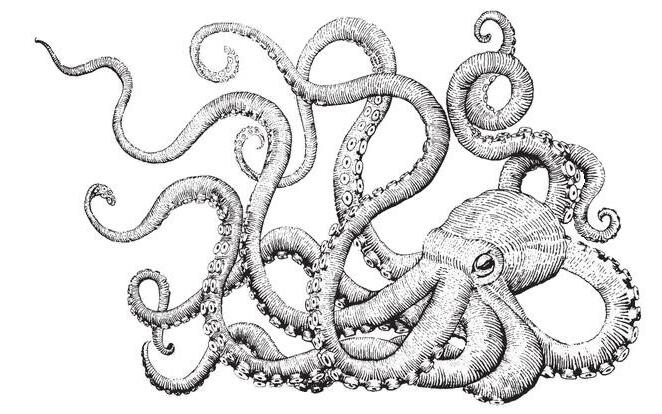
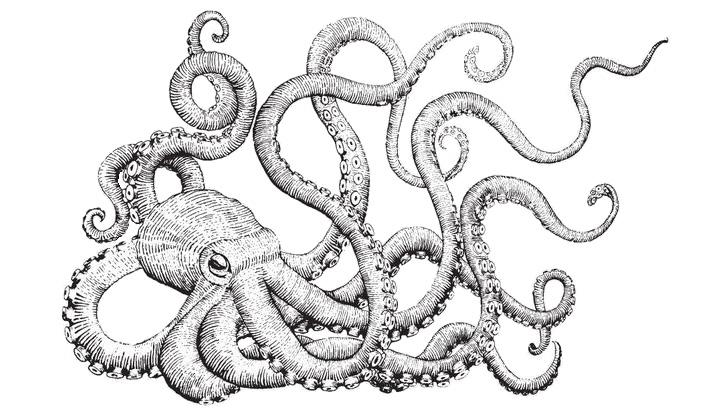
Melissa A. Chappell On Hurricane Helene
The river forgets its name, its language, foreign. Tongues sent from heaven overcome the freshets, Yet the river rides the stony bed, a mad horseman. The dissonance split rocks and ears, Earth lies confused, even the egret.
Little houses watch the river with eyes, terror-stricken, For this river they do not know, in its surging wildness. Neither does the river know them; the blue mountains are sinking. A green-eyed doll is taken, a toy John Deere, a woman left childless. Beholding all of this is the egret, from an old straight-backed cedar— He does not understand this reason-defying foreclosure on the Earth. The breaking rocks, the river with no memory, must, somewhere, have a keeper. Somewhere there is a trellised sky of blue stars, awaiting the crushing of the curse.
Over the waters flies the vagrant egret, Bearing within his pulsing avian heart a name and a secret.
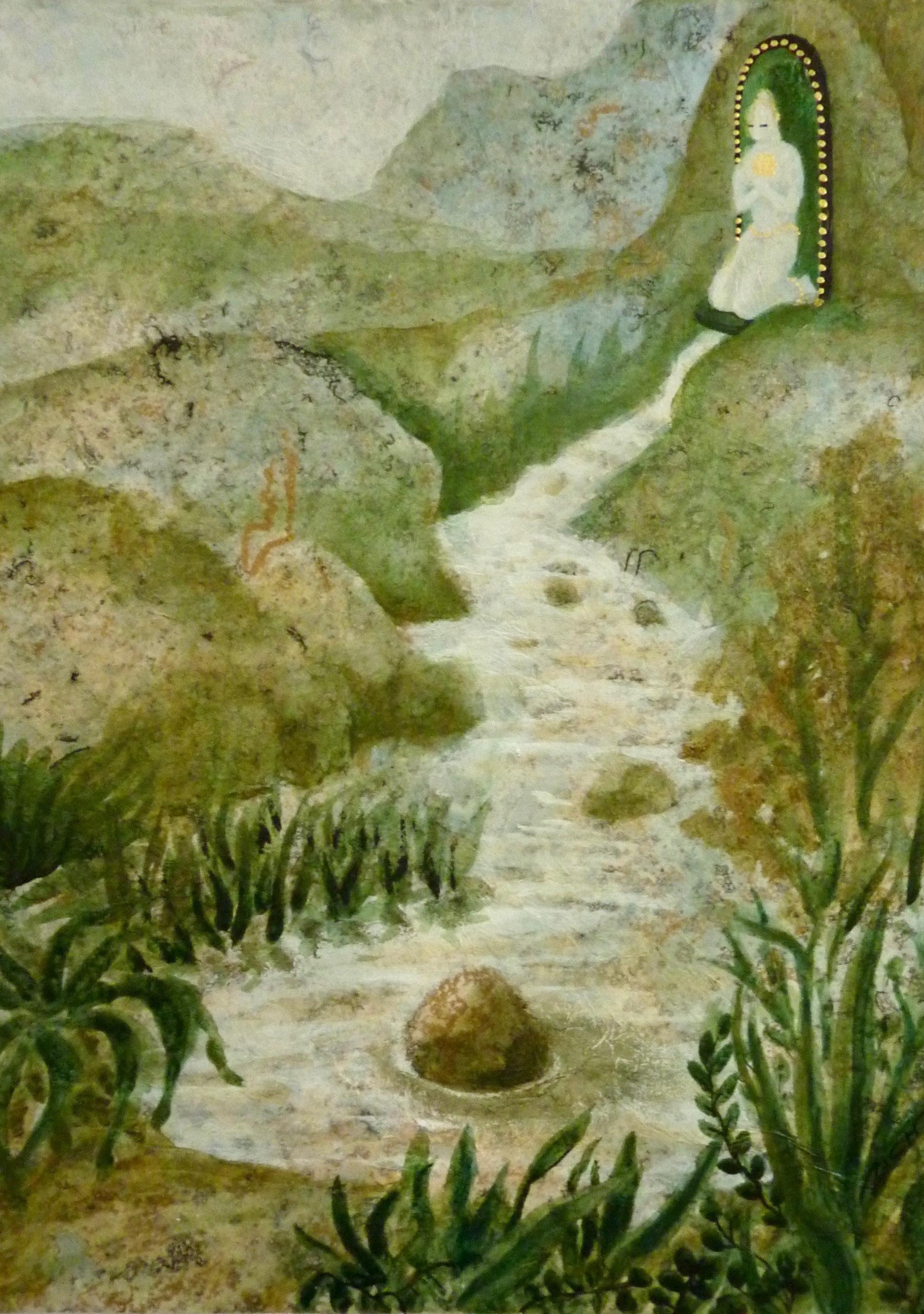


Nikoletta Gjoni
Mom slices bread in the kitchen after she has cleared away the dead cockroaches and disinfected the countertops. We had woken up to a graveyard of stiffened little bodies that had made their nightly pilgrimage out of hiding only to be met with a noxious landscape of whatever my parents had dumped on the floor before bed.
My brother and I are hungry first thing in the morning and my mother has promised us an Albanian delicacy—her favorite treat, she says, from when she was our age. Her necessary treat, I’d later learn, from a life built on rations. Two slices of bread, each on one plate, wait to be dressed. A spoon filled to the brim with sugar; Mom gently taps the edge of it over each slice; wispy snow flurries coat the spongy surfaces. Then comes the olive oil drizzled on top until both pieces are drenched in a slick, crystallized mess of a distant memory Mom plucks from her recent past.
“Eat, eat,” she says, placing the plates on the table, two glasses of milk appearing in front of us. It feels like dessert for breakfast, and I kick my feet back and forth in joy underneath the table. Sugar crystals pop between my baby teeth; oil lines my throat like lubricant to make way for a new language I do not yet know about. My dad left early this morning for work. The fridge’s door remains tightly shut, the stark shelves inside hidden from view until he brings home his first paycheck in America.

Christian Lozada
Uncle talks about visiting the Maui land, paying respect to the ancestors’ graves, learning about Papa’s struggles to clear titles and to keep the heiau— a Hawaiian temple—in kanaka hands.
Even though I have only driven by the property, where ghost structures house predecessors, I imagine overgrown grass surrounding stacked lava rocks— lichen-covered like a microcosm of Hawaii if only in the colors of sea-mist growing on pocked black or like a symbol of life coming after the burn. Give it one more generation and this line’s kanaka blood will evaporate while we continue to hula where many-voweled gods showed us to sway and people sold fruit and fish.
Nani says to me after the call, “That’s not a temple on the land. It’s just the foundation of the house.” And I wonder how much time must pass before the land I tread becomes holy,
or if it’s just waiting to be properly misidentified—like all places— as the spot where angels, both beautiful and terrible, decided to dance.

Walls of glass glittering in the sun; walls of men working in the air suspended against the heat of the sun— their task suspends them from their fear. Walls of glass glittering in your eye; walls of girls laughing, walking by— climbing escalators, they stroke their phones to check the latest message and wait in a line. Walls of glass glittering like cinema; walls of kids kicking outside hot pot shops, curiously gazing at a cigarette’s death between a parent’s fingers, turning to dust.

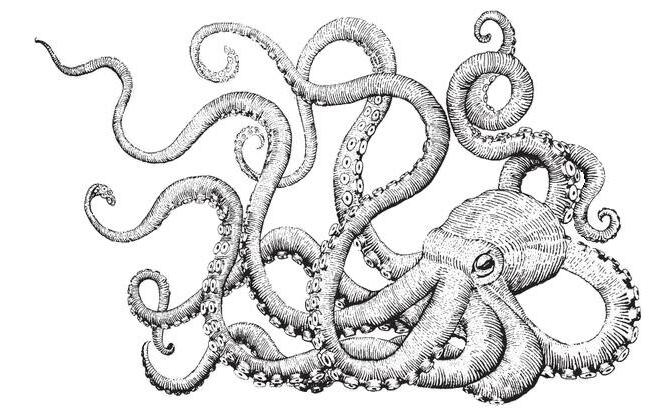

LIST OF DREAMS FROM MAJDANEK IN UPPERCASE TO GET CLEAN; TO BE FULL; TO DRINK LIKE A CAMEL FROM A TROUGH; TO PRETTY UP IN A MIRROR; TO SLEEP WITH WIDE LEGS, ROOM TO ROLL; TO BASK IN SUNLIGHT; TO SEE A BLUE, BLUE SEA; TO LIE LOOKING AT THE SKY; TO PRAY WITH FERVOR AND WITH SINGING; TO HOLD TIGHT TO SOMEONE ELSE’S HAND; TO DEFECATE IN PRIVATE; TO HOLD A CHILD; TO WAIL WITH GRIEF; TO BE LOUD, LOUD!
#
The hair arrived in bundles every morning. First small amounts, and then mountains. It had to be cleaned, brushed, measured. Polish women sat on the floor and wove mats from the strands. Others prepared it for shipping. It came knotted, infected with lice, caked with bile or blood. Rough broken curls. Sometimes long silky blonde, and they’d wonder: Jew or communist? They made bets that couldn’t be verified. They lay across the bundles like a mattress. They held hair to their foreheads to test the style of a fringe. Some of the older Poles were superstitious, called it bad luck; some pocketed locks for keepsakes. Remnants of a corpse. They cleaned, brushed, measured the hair. #
The sky is clear today and the rest of the children are out in the street because the men are dancing with the Torah. Tatty only let us outside for a few minutes because he does not think we should be making a scene. The goyim do not like us even when we are quiet. There is not much candy to go around this year but I got a handful of sugared almonds which I could not help but eat immediately. I wanted to kiss the Torah but they did not bring it over to the women. I am too old this year for my father to throw me up in the air or to run along with the boys, and I must stay away from trouble and keep my
shoes clean. Tatty made me promise to be a good Jewish girl and I did, but I wasn’t happy about it. I’ve got great big dreams and none of them fit in the ghetto but I’ve got great big hope as well. I wish I didn’t eat the almonds so fast. I run my tongue over my teeth so many times, trying to get another taste of sugar.
And the prayers rang out and the pleading rang out and we fought and we worked barren soil and we waited for reprieve (who wouldn’t?) and the cries of Schnell rang out and jüdische Ratten and the spit of their smiling mouths and we worked barren soil and we ate grass and we ate dirt and we watched the smoke blow across the fields and we ran across the fields and we dreamt of a barrack of our own and we waited for reprieve (who wouldn’t?) and we worked barren soil and we were freed and we were fed and there wasn’t enough left in us to be believers and yet the prayers rang out . . .

Diane Callahan
Go to the beach—Hilton Head probably, that surf shop where, next to the Beach Bum T-shirts, sit too-small glass tanks of neon shells, dry sponges, and hermit crabs with matchstick legs. Cradle one in your too-small palm. Back home build him a Lego mansion four stories tall but with steps for climbing and windows for the cat to watch and pellet trails leading to the labyrinth’s exit. Frown at the highlighter-yellow shell, how dirty it gets in the sand, and take your pet to the bathroom sink, the one with the faucets that are hard to turn. Give the hermit crab a bath in hot water that feels good against your skin but watch all his little legs fall down the drain and hold the empty shell between your fingers hold it still.
Grow older and learn how they shed their exoskeletons and how fragile they are at this time and how their lifespan is decades, not six months, how the sand must be deep, and how much they need other hermits.
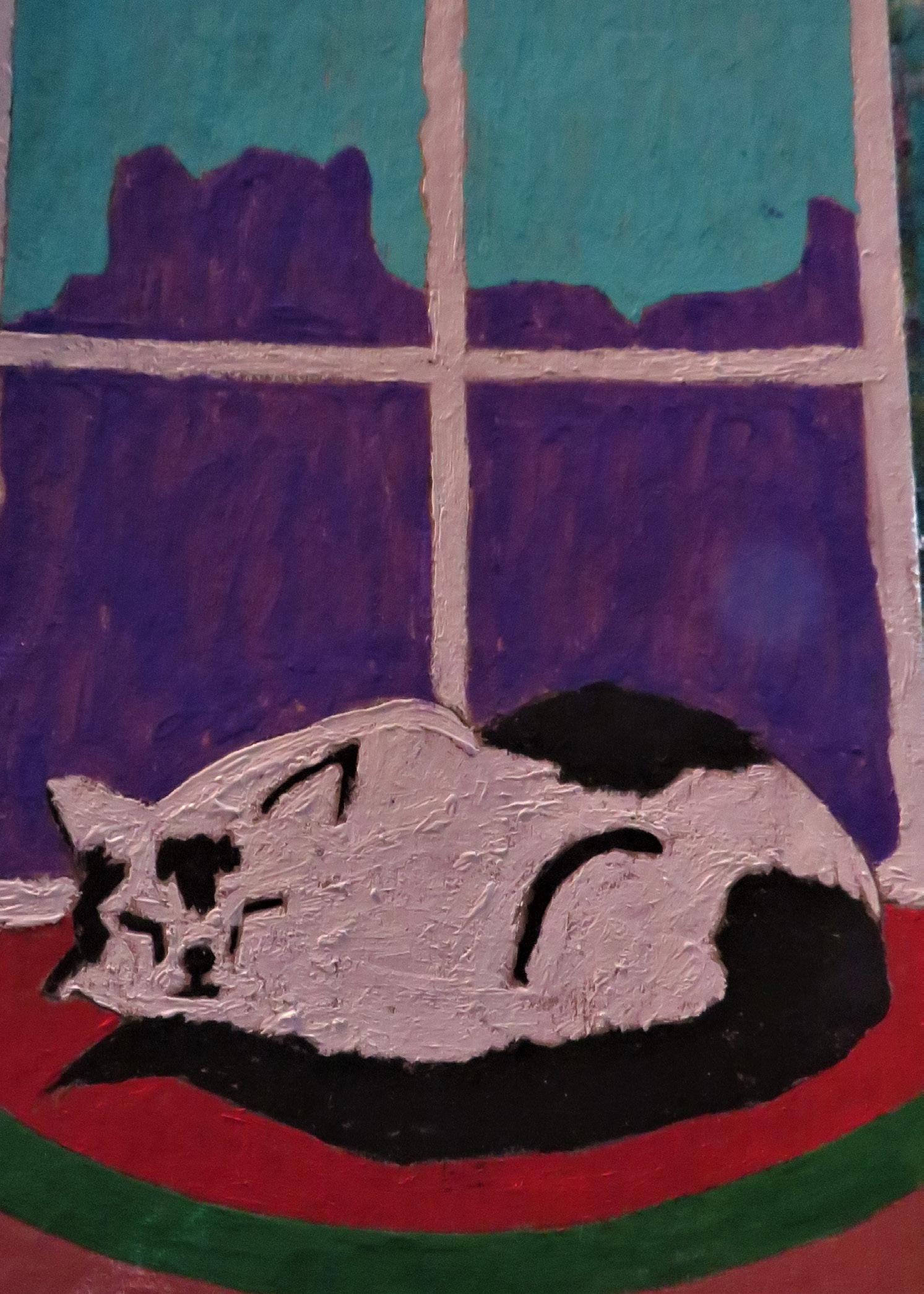

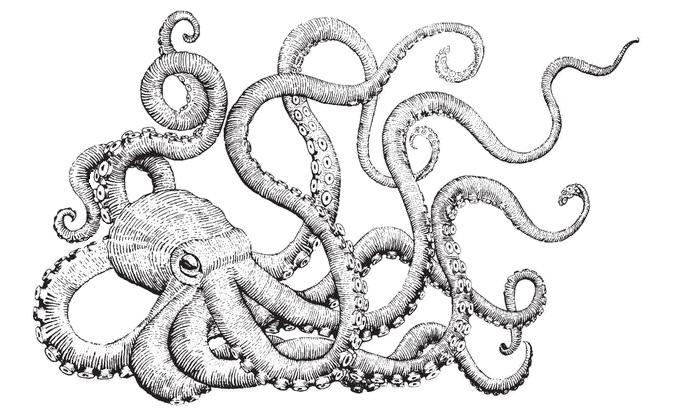
Alex Dodt
After three funerals in five months, my father grew Abraham’s beard & hid prayers in the floorboards beneath his breath. He would go into his office after dinner, shut the door, & wail like the coyote that paces the canal behind our house searching for a way across. No one ever knocked, knowing not to interrupt him at work. I am requesting an audience, an apology—the sound of bolting locks, God’s maid
chasing me off the porch with a broom. The sermon says Redemption. The sermon does not say whose flight made this chasm. In a queue at Heaven’s guard shack, I see its iron spires, never-ending, pierce the clouds. The children God gifted Job were not the same children God let Satan take any more than I am the same boy in the photo in my father’s office, squeezing the lapels of his handme-down suit buttoned twice & still sprawling. Once, we imagine our parents in Heaven electing to be again themselves before us.



The kid—they call him Spud—sees it while walking the mile to where he catches the school bus every morning except Thursdays when his mom pulls a shift at the school cafeteria and drives him there at seven sharp. But this is a Tuesday, and Spud is taking his time, doing his best to kick every stone, every discarded can, every clump of dandelions between his family’s potato farm and the intersection of Maple and Cedar, where the bus will most likely wait if he’s running just a little late. On the days he misses it, he walks the three miles to school alone. It’s a hike his father refers to as a “righteous lesson,” although it’s one the boy has yet to learn fully.
He’s just kicked a perfectly round stone a distance that surely must be some kind of rock-kicking record when he spots it. A goat. Atop Uncle Henry’s barn. Chewing at the mounds of moss that collect there until Uncle Henry pays some cash-hungry teenager to scrape them off. The misplaced animal is ripping out a chunk, chewing, and occasionally looking around as if it’s grazing in a normal way, like in a field or some other situation that’s not as odd as the roof of a barn.
The boy watches for a minute, thinking maybe he’s overslept again and this is just a dream, when the sound of bus gears shifting down activates his brain enough to get his feet going. He makes it to the corner just as the bus comes to a full stop.
The doors open, but Spud pauses, looking back and pointing. Mrs. Hargreaves, the bus driver for over thirty years, bends low to see what’s grabbed this dim-witted child’s attention. She lets out a long and low whistle, alerting every kid to move to the right side of the bus to see what’s creating a response in a woman who never reacts to anything, not even spitballs. She lets the kids appreciate the spectacle for a minute, then forces the old heap back into gear. She’s a woman with a schedule, and no goat on a roof is going to keep her from it. The bus lurches, coughs, and lets out an exhale of black.
The story doesn’t take long to circulate through a school with only four rooms. Questions and theories abound, mostly concerning where the goat might have originated. Uncle Henry has no goats, not even a sheep that might be confused for one at a distance. He owns one horse and one dog, neither of which resembles a goat in the least. Then, of course, there’s the question of how a goat could find its way to the roof of a thirty-foot-high barn. Had it come from above, dropped by a plane or a helicopter?
“A spaceship,” Miss Pierce, the home economics teacher, says. She, Mrs. Bean, Mr. Holmes, Mr. Johnson, and Mrs. Hargreaves have gathered in the teachers’ lounge between first and second period. “I’ve heard of such things on one of my podcasts,” she says. “The aliens test animals and then just drop ’em. Poor thing’s probably pregnant with some alien-goat horror.”
“I say we shoot it down,” Mr. Johnson says. “Who knows what contagion it might be carrying? Or if it’s even a real goat at all. Some horrible mutation or something. Shoot it, I say. Just in case.” He’s a lover of all instruments of aggression. His collection of antique guns and swords is a prideful display at his annual holiday party. It’s also why most of the other teachers avoid lengthy conversations with the man; he steers all topics toward war and other hostilities.
After a lively back-and-forth between the staff, resulting in every theory involving our realm and beyond, it’s agreed that a field trip is in order. After the students are corralled into the cafeteria for lunch, the faculty—Mrs. Bean, Mr. Holmes, and Miss Peters—file onto the bus with Mrs. Hargreaves. Mr. Johnson, thanks to a bit of trickery by Mrs. Bean, has drawn the short straw and grudgingly agrees to stay with the kids.
“I have a .22 in my truck,” he calls after them. “You should grab it. Just in case.”
The offer is ignored.
The scene is as it had been described. The animal is happily chewing on the moss and the roof tiles that cling to it. A few cars are stopped on the road parallel to the barn, and a group of gapers has gathered along the grassy gutter.
“Are we sure it’s a goat?” Miss Peters says. “It’s awfully small.”
A man from a neighboring car yells out, “Definitely a goat!” He’s hanging
from the passenger window with a pair of binoculars. “It’s a doeling, I think.”
“That’s a young female,” Mr. Holmes explains to the women who surely do not know of such things.
“Yes, Mr. Holmes, we know,” Mrs. Bean says. “I grew up on a farm, in case you’ve forgotten. But I’ve never seen a goat on a roof. How would it even get up there?”
“It’s a prank,” Mr. Holmes says. “Some fraternity initiation or something. Just kids being wild.” He chuckles the way men do when they know things others do not.
“What fraternity?” Mrs. Bean pulls a wrinkled tissue from her sleeve cuff and wipes at her forehead. It’s only 10:30 a.m., but the September sun is already beating down as if it’s mid-July. “There isn’t a college near here for . . . geez . . . maybe eighty miles?”
Mr. Holmes laughs. “Those crazy kids will go a long way to pull a prank. You got no idea, Gladys.”
Mrs. Bean gives him a flash of reprimand to remind him not to use her first name around the others. It’s a rule they’d agreed upon at the beginning. Mr. Holmes shrugs an apology.
The goat isn’t doing much, just lowering its head for the next batch of moss then chewing . . . and chewing . . . and chewing. The teachers watch, barely talking. The other onlookers get bored with the goat’s repertoire. Doors slam, gravel is kicked up, and a cloud of beige dust envelopes the teachers. Miss Peters coughs and pulls a hanky from her purse to cover her face.
“What should we do?” she says through cloth. “We can’t just leave her there.”
“We need a plan,” Mr. Holmes says, his eyes squinted as if he’s devising one.
“Well, we’re not going to solve anything by standing on the side of the road,” Mrs. Hargreaves says. “Let’s get over there, and we’ll figure it out.”
“Will the bus make it through that field?” Mr. Holmes imagines it bouncing over the acreage like a cartoon truck. He’s excited.
Mrs. Bean rolls her eyes. “How about we take the driveway like the intelligent people we’re supposed to be?” She points toward the dirt road a hundred yards to the right.
“Sure,” Mr. Holmes says. “Not exactly a straight line, but we can do it your way.”
The drive is a dusty one. Due to the heat of the day, the windows are all down, and clouds of sandy smoke fill the compartment. Miss Peters waives her hanky at it, coughing dramatically. She moves to put up her window, but Mrs. Hargreaves sees her in the oversized rearview mirror and yells out, “Don’t you touch that window, Sylvie. Takes me nearly an hour to wrestle the rusty things down. It’s a hot one, and I don’t intend to do it again.”
Miss Peters has learned over the years not to challenge the older woman. She coughs again and leans back, covering her nose and mouth.
The farm seems deserted. Uncle Henry’s truck isn’t visible, and his dog, the Buckster, would be barking and snarling like Cujo if he were there. He’s a gentle dog, but he knows his job.
“It’s Tuesday,” Mr. Holmes says. “I bet he’s at the farmer’s market in Thomaston.” He points toward the far side of the barn. “Keep going, just drive around the back.”
Mrs. Hargreaves doesn’t move, staring back through the rearview at Mr. Holmes.
He catches her eye. “Please,” he adds, remembering that look from when he was a regular passenger on this very bus.
“That’s better, Gavin,” she says, and then follows the dirt track that leads past the house and outhouse, ending at the rear of the barn.
“There’s a ladder,” Mrs. Bean says, excited. “I’ve heard about goats climbing ladders.”
“So have I,” Mrs. Hargreaves says. “Saw it at a circus when I was a kid. Over in Bangor, back when they made animals do stupid stuff for laughs. They climb pretty fast, too.”
“But how do they get down?” Miss Peters’s voice is trembling. “It could die up there with this heat.” She’s on the verge of a larger emotion, one that she’s known for.
Mrs. Hargreaves turns in her seat and points an index finger at the young teacher. “There’s no crying on my bus, Sylvie. You button that up right now. Hear me?”
Miss Peters wilts and nods.
“Well, I guess someone’s going to have to go up there and figure it out,” Mr. Holmes says, swallowing hard. The large man of fifty-five has only one phobia: heights. Very few people are aware of it. His parents knew. His wife, as well. And he’d once shared his fear with Mrs. Bean. They were in his car on one of their long, clandestine rides when both of them confessed secrets in the hope of deepening whatever their fresh bond was.
“I’ll do it,” Mrs. Bean offers. “I’m a climber, always have been. All I need is something to wrap around the goat.” She stands, straightens her skirt, and pulls her knee-highs up as far as they’ll go. She looks to Mr. Holmes for just a second. The man looks away. “Jeanie? Do you have a blanket on the bus?”
“I have a fire blanket,” Mrs. Hargreaves says. “Will that do?”
“Nah, too heavy. It’ll suffocate the little thing. Nothing else, huh?”
“Here,” Mr. Holmes says, already unbuttoning his shirt. “I’ll be fine in a T-shirt.” He holds out the striped button-down to Mrs. Bean. She accepts it without eye contact.
“Okay, let’s do this.” She exits the bus and starts for the ladder.
But Mrs. Hargreaves, a woman of the church with a keen understanding of how men’s minds work, considers Mr. Holmes and his unchecked adoration for the biology teacher. She will not allow a woman to climb such a long and steep ladder in a skirt. “Take my pants,” she says. “We’ll change in the barn.”
Their sizes are different. Mrs. Hargreaves is considerably taller and wider. Mrs. Bean rolls up the legs, but the waist requires a belt. Mr. Holmes offers his, despite his confusion about its necessity. Mrs. Bean nods her appreciation.
With the shirt over one shoulder, she starts up, testing every rung of the old wooden ladder before applying her full weight. The others are standing at the base, watching each step, arms bent as if to catch her. She can feel their eyes, and she’s grateful for Mrs. Hargreaves’s concern. She’s not wearing the undergarments she usually wears with Mr. Holmes. They’re less colorful and more tattered, like most of the underwear that fills her top drawer.
She leads with her left, bringing her right to meet it. The rails groan, and she occasionally looks down at the three small, encouraging faces. When she reaches the last rung, she sees that the goat is watching her too, munching on a bit of shingle, her head slightly cocked as if this woman, and not herself, is in a place she doesn’t belong.
“Hey, girl.” Mrs. Bean offers a hand, palm down, as if to a dog. The goat goes back to the roof, already having lost interest in the woman who is now crawling toward her. “You’re a small one, aren’t you? You climbed that big ladder all by yourself?” She stands and takes slow, careful steps toward the doeling, mindful of the mounds of moss that could send her sliding off the edge. “Wouldn’t you like to come down, sweetie?” She’s holding out the shirt now, shaking it like a novice bullfighter. A breeze catches the fabric, and the scent of Mr. Holmes’s aftershave drifts into her. It’s a common brand, one that smells like spice and earth. She’d hated that scent a couple of years ago, but it’s grown on her. It brings up memories of their early meetings in hotels and cars and out-of-town restaurants. She closes her eyes, breathing in deeply, and doesn’t notice the goat’s approach until it’s too late. The shirt is ripped from her hands, and the animal bucks with pleasure as it shakes and chews the polyester.
“Oh, no!” she screams and pees a little into the old underwear. “Bring that back, you little beast!” She starts after the animal, but her right foot lands on a clump of moss, sending both feet out from under her. She claws at the shingles, some of which slide past her and soar off the roof. Digging in her heels and palms, she manages to stop less than a foot from the edge.
“Are you okay?” The call comes from below. It’s her lover, and she will not answer. There’s been a thought humming in her brain for weeks, and it’s buzzing loudly now. She’s in love with a married man who remains on solid ground while she takes all the risks.
Scrambling on all fours, she manages to get back to the goat. It’s lying down now, panting heavily, in obvious need of water.
“How the hell am I gonna get you down, girl? You won’t let me carry you, will you?” She moves closer and attempts to put an arm around the animal. It wriggles and kicks. “You need to calm yourself, missy, if we’re gonna make it down in one piece.”
But how? She’s a strong woman by any standard. A woman who can hold her own on any court or field, even in a ring, which she’s done a couple of times. But goat wrangling is a new sport for her. She assesses the conditions. Slanted roof. Mossy surface. Heat. Dying goat.
Mrs. Bean understands what she needs to do—for the animal and for her. She will later describe it as a flash of sanity. Or clarity, she’ll say. The goat is part of it, of course. The poor thing needs to be saved, but so does she.
“One thing at a time,” she says. The goat bleats. She looks around for something to wrap it in, but, of course, there is nothing but the remnants of
a mostly eaten shirt. It takes a minute to recognize the only possibility. “Shit, I’ve already lost my pride. What do I care?” She removes the belt and wriggles out of the heavy jeans that cling due to the sweat on her legs. “You’re not gonna like this, honey, but it’s the best I got.”
The doeling has quieted as if it knows it must, or it’s become too tired and hot to care. Mrs. Bean wraps the jeans around the middle of the goat, folding in her legs and securing them. She binds the bundle with the wide belt. Mr. Holmes is a thick man, and the leather winds around the animal’s waist twice. It stretches from below the goat’s neck to its hind legs, and she cinches the buckle at the top of the animal’s back.
“I’m gonna haul you down, honey, but if you start bucking and wriggling we’ll both break our necks.” The goat responds with a soft, pleading maa.
Gripping the belt at the goat’s middle, she slowly scoots them both to the ladder. As she swings a leg onto a rung, the doeling lets out a desperate cry. It bucks when Mrs. Bean lifts her off the roof and into the empty air, but the teacher holds tight to the ladder, leaning into it. When the animal calms, she starts down, leading with her right foot and bringing her left to meet it.
She can feel the breeze against her underwear. It plays with the bits of thread that are barely holding the fabric together, and she’s surprised at her lack of modesty. The progress is slow, and just once she looks over her shoulder. Mrs. Hargreaves is watching, standing a little off to one side to avoid the possibility of a fall. Mr. Holmes is gaping, arms folded tight into his chest, his jaw moving as if he’s praying on each of her steps.
The spectacular descent of woman and goat seems to take hours. In reality, it’s less than ten minutes. Miss Peters stretches her arms to meet the duo and takes the goat from Mrs. Bean. Mrs. Hargreaves helps undo the bundle of pants and belt and then turns to Mr. Holmes. “Gavin, you give the poor girl some privacy.” She points the man toward the other side of the bus. He protests but obeys.
“Is she okay?” Mrs. Bean says to Miss Peters, who is coddling the doeling and whispering in its ear. “She needs water. I saw a bottle in the bus.” She starts but Mrs. Hargreaves stops her.
“Nope. Let Sylvie get it. We need to get you decent.” She takes the younger woman’s hand and leads her into the barn. “How are you feeling after that?” She waves the jeans violently to get the hair and any lingering critters from it.
“I’m okay, I guess. Relieved we made it down. It could have been worse
if she weren’t so tired and thirsty. I think the poor thing had no idea she’d ventured into a place she didn’t belong.”
“Yeah, goats aren’t that different from people, are they?” Mrs. Hargreaves sits on a bale and pats the spot next to her. “Rest for a second, Gladys.”
Mrs. Bean says nothing. She pulls on her skirt and buttons it before sitting beside the older woman.
“You deserve better,” Mrs. Hargreaves says.
The younger woman is silent. She rubs at the dirt on her knees, her head lowered, her heels banging against the hay bale like a child.
“I see everything. You get to my age, you can’t help it. How many years since your divorce?”
“Four.”
“Probably a little lonely, ain’tcha?”
“Yeah,” Mrs. Bean says. “And I’m feeling a little stuck lately. Not atop a roof, but maybe down a well. Think I might need some rescuing, Jeanie?” She shakes out the dark curls from the knot she had forced them into that morning.
Mrs. Hargreaves barks a laugh. “What the hell you talking about? You don’t need no rescuing, Gladys. You’re plenty strong enough to get out of any well or off any miserable roof all on your own.”
“Am I, though? I’m not so sure. I don’t get it, why we girls get so stuck, holding out for what? A promise? Jesus, we can be weak, can’t we?”
“From where I’m sitting, you’re the strong one. That man out there? He’s not making any decisions. He likes it just the way it is with this sweet girl holding out for a dream. You take charge, honey, and you’ll be fine.”
The goat is drinking eagerly from the bottle. Mrs. Bean takes over from Miss Peters, kneeling next to the doeling, petting her sides, murmuring encouragements. When the bottle is drained, she says, “Okay, little girl, time to go home.” She makes shooing gestures, but the goat doesn’t move. It stands in the middle of them, looking from one to the other, before settling on Mrs. Bean.
“I think it likes you,” Mr. Holmes says.
“A lot of people like her,” the older woman says.
The inference is not lost on the man. He locks eyes with his lover and then looks away. “We should probably get back.”
“What about her?” Miss Peters says, her voice quivering again.
Mrs. Hargreaves dismisses the concern. “She’ll find her way home once we leave. Come on, pile in. Poor Mr. Johnson must be going nuts by now. Hopefully hasn’t shot a kid.”
As they head toward the bus, Mr. Holmes leans into Mrs. Bean. “That was amazing, Gladys. You’re really something, you know?”
Mrs. Bean looks at him, his tousled brown hair, the tilt of his too-large head, the cleft in his chin that always hosts a few unshaven hairs. She starts to smile, but then it falters. She climbs onto the bus without a word.
They’re halfway down the dusty driveway when Mrs. Hargreaves calls out, “That damn goat is following us. Must be lost.”
Mrs. Bean leans out the window and sees the doeling trotting behind them through clouds of dust. “The poor thing’s gonna get a heatstroke or a heart attack. Do goats get heart attacks?”
“Hell if I know,” Mrs. Hargreaves says. “What do you want me to do, Gladys?”
“Don’t do anything,” Mr. Holmes says. “He’ll get tired eventually and go home.”
Mrs. Bean turns on him. “First of all, the goat is a she. And finding your way home isn’t always that easy.” She rises slowly, feeling the effects of the roof in her muscles, and moves past Mr. Holmes to the front. “Pull over, Jeanie. Please.”
Mrs. Hargreaves slows, pulls to the side, and opens the door.
Mrs. Bean steps out of the bus and bends a dirty knee to the road, her arms open wide. This story is

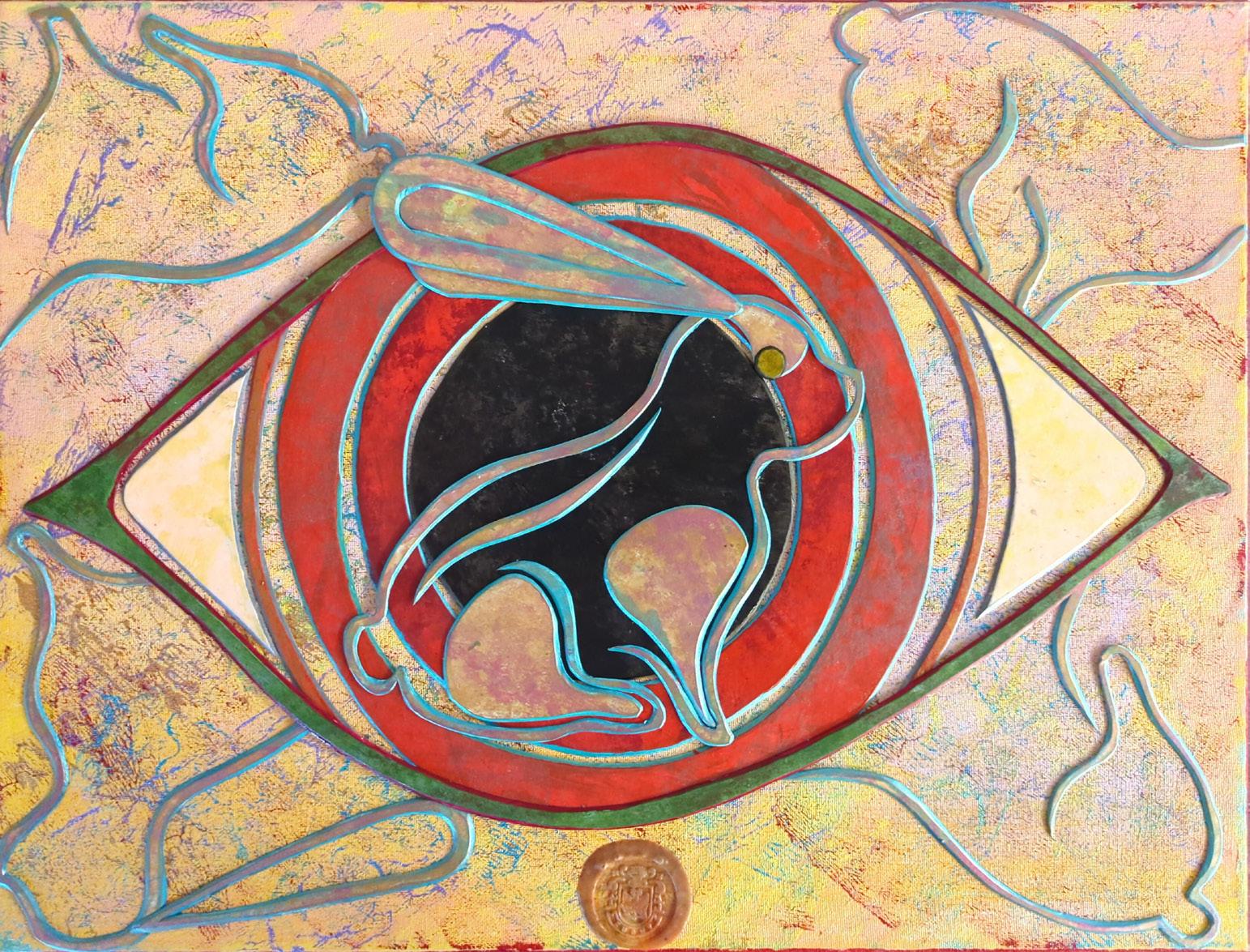


Kelly Granito
We ask that your poems convey a coherent message and are of a high literary standard. Be a thistle, sharp and flowery. Be a corpse lily, entertaining and dark. Use sex to break lines. At least do something to surprise us. Although we love Mary Oliver, we don’t want your best Mary Oliver impression. You’re not all soft animals; some of you are tilled earth that longs to be plowed without being touched (sick as you are of the communality of your breasts; small hands that seize them as if twisting corn off a stalk; how as you lay on your back, still awake, they sink into your chest like sand dollars and your sleeping husband feels around for one in his sleep like it’s you he dreams of scooping into a bucket at low tide). We need more from you about regret—more odes to the waves of rage you feel as you do the night feedings. No need to announce your heart. Just show us the only small and soiled thing left to wash, fold, and toss into a pile. If you do nothing else, please tackle hard-hitting themes in your submission.

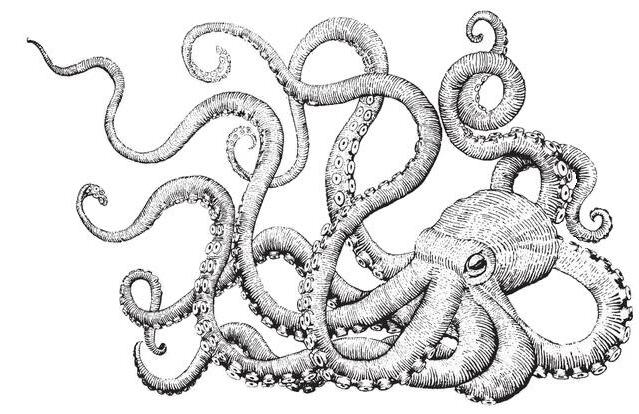

Brian Chan
Mom, you were still asleep when you erupted into a crescendo of flashing sound. An awful sound—a kettle collapsing
into a fistful of kitchen light. Bàba, you repeated, shrill as a bird, the wails of the mattress revolting beneath your spine.
In the morning, you told me you dreamt of losing Bàba in the subways of your Chinese hometown, in corridors of ghost trains and peeling walls. How
all the half-living faces around you collapsed into Chinese radicals, lost symbols of home. How you coiled into yourself—a girl soured
with brush strokes, metalizing into abandoned tracks. You ran the tip of your shoes along the subway tiles, tracing a path back to childhood.
Only when you are awake, I find you—yellowed light pouring over your hair—hunched over the swollen newspaper, its bleeding headlines:
Gun-emptied schools; Chinese boys who don’t return, violenced and lost. Mom, here
is the truth: That night, I rushed in the moment I heard the flash— your throat boiling over. The bedroom was eroding into black skeletons. Shards of fractured teeth, bullet casings sealed in ice—gunshots pooled at our knees.
My reflection branded onto the ceiling—pressed in dirty ink. I had already forgotten my real face—remembering only the shattered remnants within your memories. There was enough moonlight gashing through the roof to witness your lips trembling—barely hollowed into the O of a clenched fist. Mom, your hands were made for latching on to sons; closing wounds; pulling triggers. And whether it was the frozen light burrowing into your eyelids, or my hand reaching out for yours—for some reason, you stirred. You murmured: But what about the kids—
the kids the kids the kids
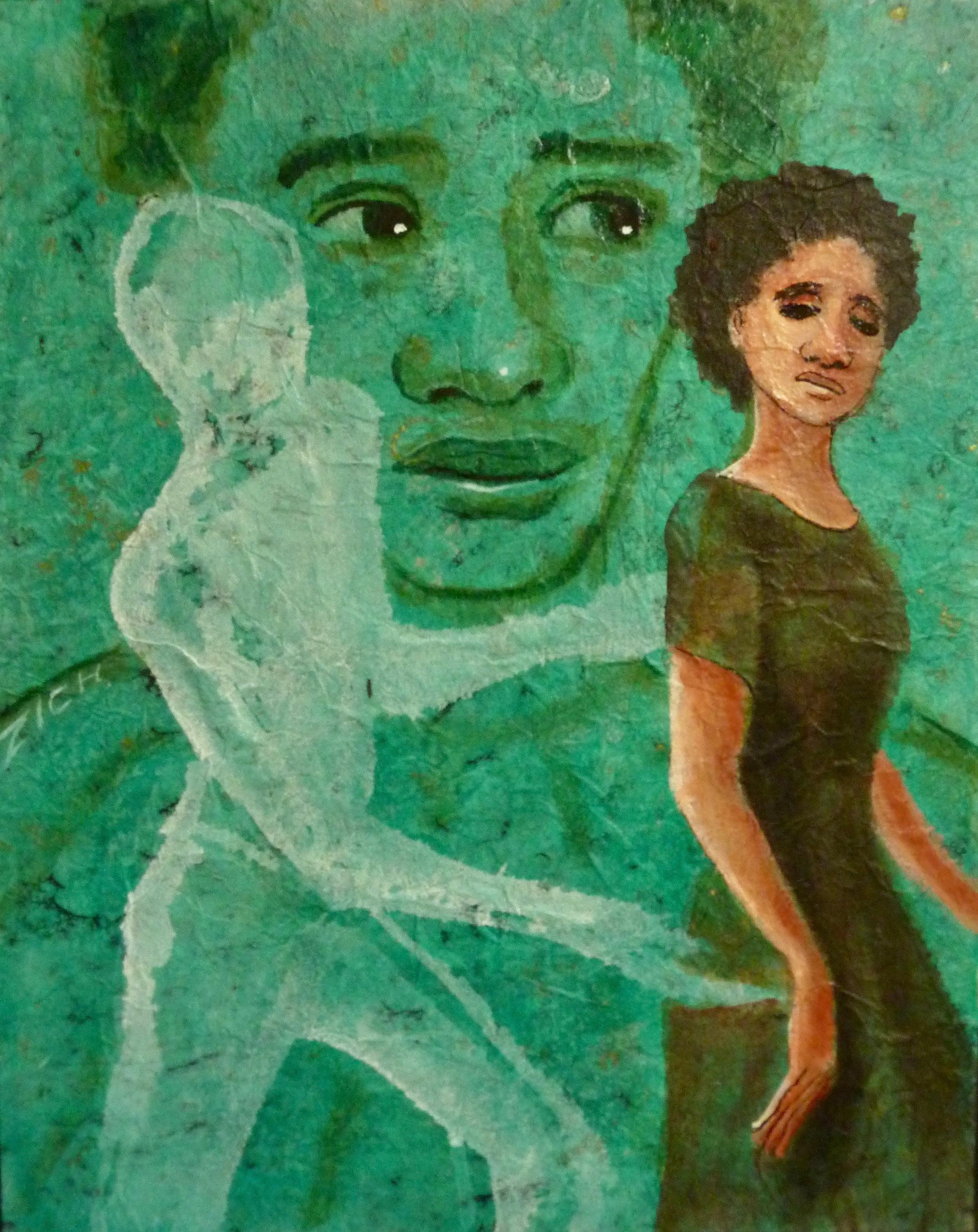

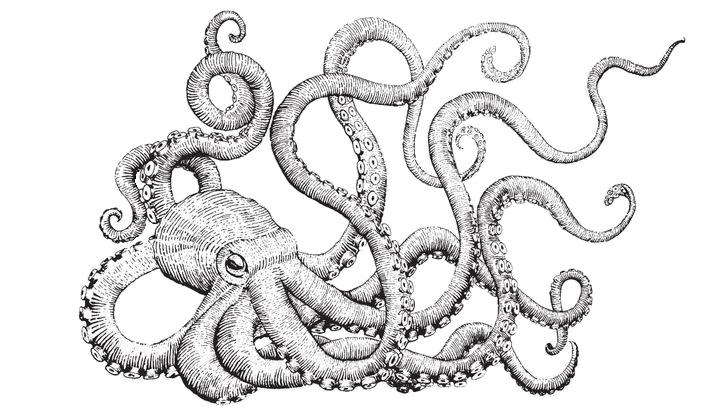
WSophie Hoss
hen I’m feeling down, I go for nighttime swims with the aquarium turtles. I was hired as a security guard because people keep trying to steal our very expensive penguins. In my opinion, the sea turtles are the real prize. They swim in happy little circles when they see me coming.
Our most sought-after penguin is named Edwin. He can spin on his head and even beatbox. So far, there have been seven attempts to abduct him, and I stopped all but one of them. Luckily, the penguin who was taken wasn’t actually Edwin, but his less talented decoy, Rocco. The resemblance is uncanny.
Last night, one of the sea turtles rested his head on my shoulder and nibbled me with his beak. I offered him a cigarette, but he told me he’d been trying to quit.
“More power to you,” I said. “I’ve been thinking about quitting myself.”
We bobbed up and down in the turquoise water, and even though only one of us had a shell, I swear it was like we’d hatched from the same egg.

This story is co-featured on The Short Story Project website.
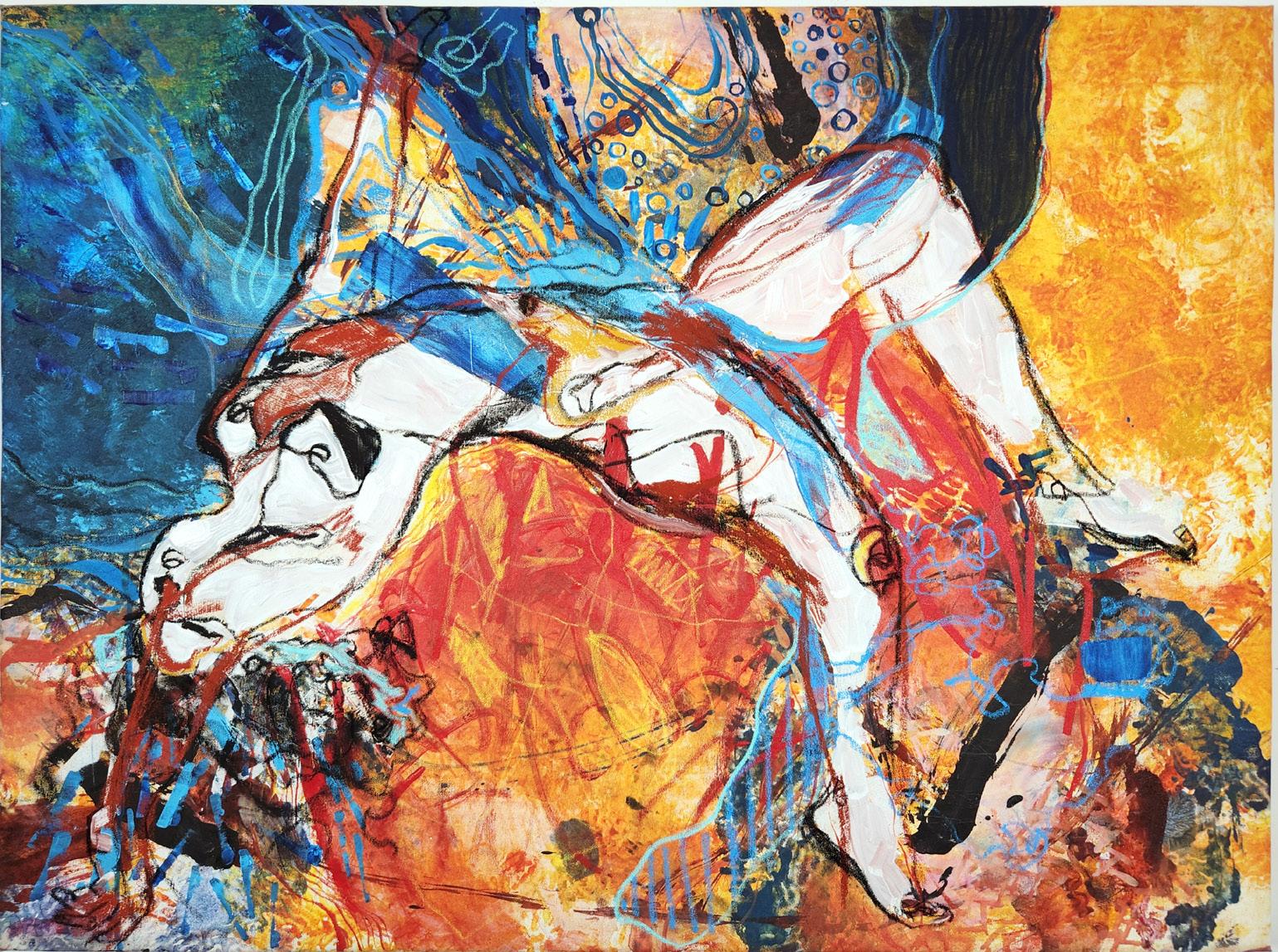

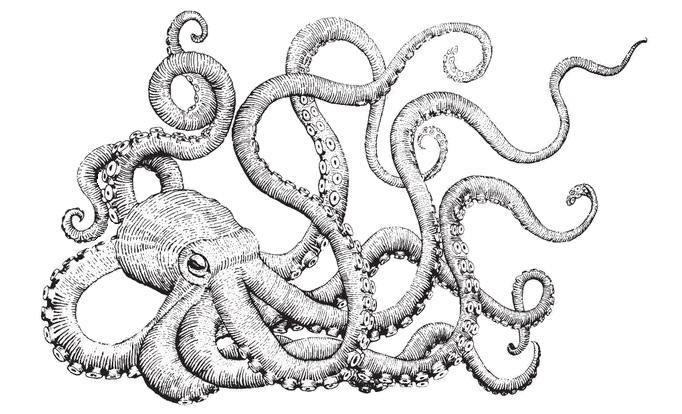
Shou Jie Eng
Thus it appears that the sweltering inhabitants of Charleston and New Orleans, of Madras and Bombay and Calcutta, drink at my well, wrote Thoreau, and he meant—or might as well have meant without saying so—Colombo, Havana, Hong Kong, Singapore, and so on, while also meaning none of them at all. In truth, apart from the South he only meant the Bhagavad Gita in translation, through which the frozen pond at Walden changed states, becoming the sacred water of the Ganges.
POETRY
after
Jenny Xie
// Air, conditioned. Cools and condenses against the wet bulb of a soil, now dense with language. Meanings touch the tongue of a child learning to say ㄅ ㄆ ㄇ ㄈ—no rhoticity in the sounds bo po mo fo for their ears to hear. The world seen from inside this conditioning resembles a city cast in vapour.
Curtain of breath against its outside self.
Since we speak of meanings, we might also say that meanings crystallise like ice, which is to say they gradually slow their humming until appearing fixed in place, sheeted lattices occluding from sight deeper water beneath. Still moving.
// Inside a supermarket, vegetables are orderly. Fish lie unblinking on ice. Aunties trolley past a sign that reads Cold Storage.
To say winter at Walden Pond was to say ice-harvest. To say the many hands working the ice. The ice-men and their hands, that extract—that is, hands that drill, sink, scrape, and groove the pond.
// The sails of the ice-ships once drew against the wharves. The children of the ice-houses now stretch their fingers around the world, picking strawberries, melons, perfected fruit. Apple-shaped apples, grapes the colour of deepest royal.
Strange, it seems, to think of drinking from a well in the cold season. Frigid water.
// Sheathed in foam, fruit nestles. Sheathed in cold air, we glide by.
Men, their hands. On carts that moved the pond in cakes from water to land, then from land to water again.
Onto ships. In their charts, the gridded oceans appeared as subdivisions of the pond made monstrous.
// The ice-house in the colonies: It receives its shipments. Colonial man:
He cools his thirst. Early one morning in Cold Storage we watch a pair of hands scoop crushed ice into a case. Scoop after scoop: steady.
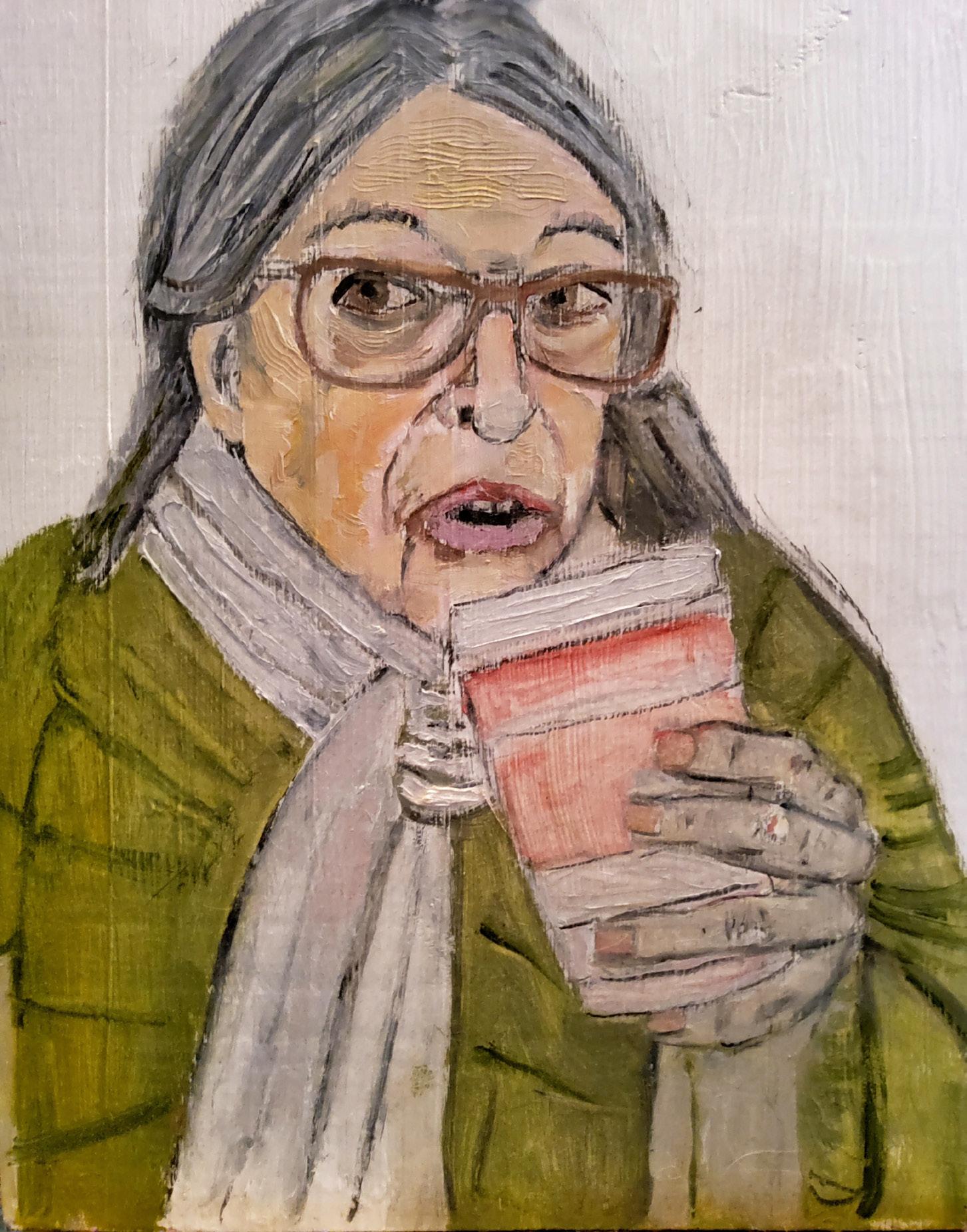


Melody Wilson
Like being / your mother’s baby—you were magic, then, / and not again.
— Sharon Olds
From May until August we squatted in an abandoned house on South and Atlantic. You cut crystal into half-gram bindles, skimmed an eighth now and then. I quit my job, slept on the couch, drove you into the projects to deliver. Afterward, we sucked the cold off coconut paletas from the tienda on South Street. You wore yourself like a switchblade then, honed the story of how our mother put me in your crib and you on the ground. You called me the parrot who sang for parties while you broke windows just to see if she would look, swallowed oven cleaner, swiped pennies, cut brown eyes in her direction. I struggled with the frayed laces of tap shoes while you hardened into long limbs— made for looking at,
for taking what she dished out. But all that summer, we blistered down South Street, crop tops and low-slung jeans. They’d honk and we’d wave, spin to watch their cars drive away. Neither of us knew we searched every face for what we didn’t get from her. But what if I had never been born? You could have been a child star, then a siren. I can almost see your brown body lit up in a turquoise bikini smelling of Coppertone, Marlboro Lights, and gin. Do you hear the Carpenters playing on the 8-track? The cocker spaniels snoring by the kidney-shaped pool?



POETRY Annie Przypyszny
I opened my pink daisy of a mouth before I even left my mother’s body, came out choking on the fluids of life. Hooked to tubes for a week, but I was alright and banshee-loud to boot. I screamed because I wanted: milk to gulp down, a lemon wedge to suck on, my Kanga plush, and Mommy, Daddy, Mommy. I was a choir howling demands, the choice rhetoric of all babykind. But as I grew, my chords seemed to forget their primal purpose. Sound began spilling out of my mouth like gumballs from a broken machine, clattering off my tongue in all sorts of gaudy colors. There was the clearing of the throat, like I was a little orator, endlessly stalling my speech; then the teeth clacking, as if emulating a cymbal-banging monkey; then the squeaks, that figured why not be chirps, that figured why not be shrieks, why not shriek and shriek for no fucking reason all the time. It had to do with the circuits of the brain. It had to do with an eponymous syndrome. It had to do with the fact that, if I didn’t let the noise make noise, I’d choke on the endless rope of my voice. Against all reason, my parents plopped me in the studio of the old opera singer— the woman with the blonde wig and neon pink lipstick whose own voice the long years had cracked like a cup. Still, splintered, she sang. She bellowed. Clanged. The notes crashed on every surface in vibrant bursts, aria-bombs exploding, rich shrapnel of vibrato sent a-hurl.
From her I learned glottal click. I learned high C. I learned slapdash Italian pronunciation. I learned gusto, which is to sing with taste, to taste what you sing. And every song tasted like cherry candy, like sweet soprano rampage: rolling, reeling, flaunted, flaring, flung.
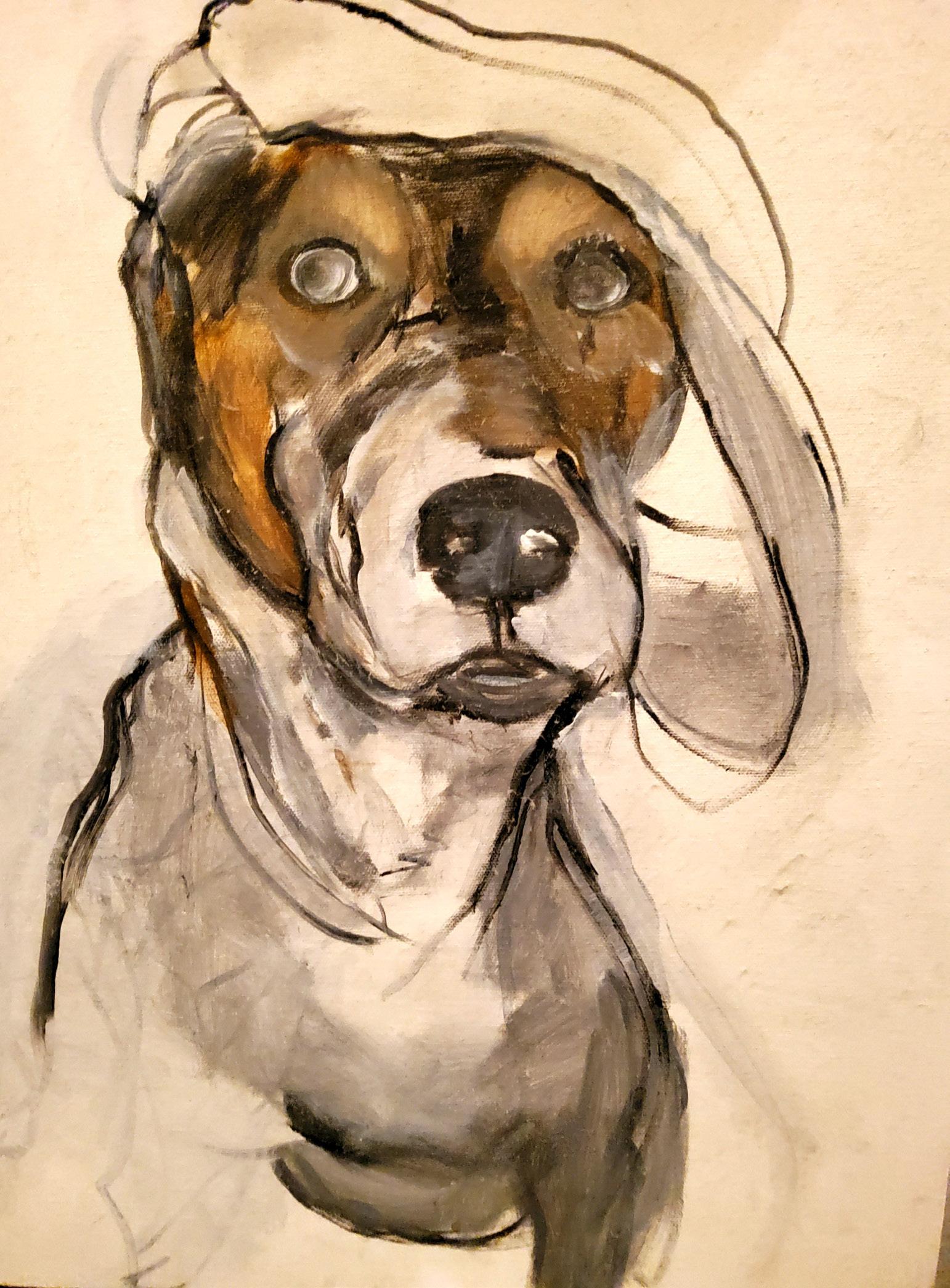
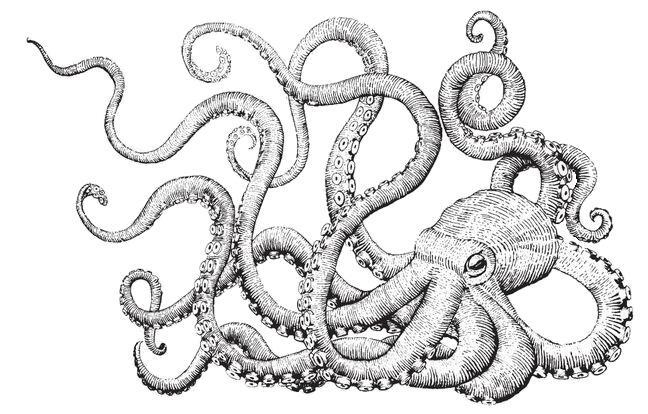

TBenjamin S. Evans
he nodes were like beetles, their black metal bodies shining between the attendant’s fingers.
“Just a pinch, dear,” he said, leaning in and fixing the nodes to my temples, measuring symmetry with my eyes and his. Buried beneath clumped lashes, his green irises dilated as he pushed. The beetles’ legs dug.
The worm moved, right behind my left eye. Like a scatter-brain pulsation, an iambic diffusion of pressure, a separation and a unification, like I forgot I existed only to remember that I was there.
The attendant wheeled his chair to the digital display in front of him, and his fingernails played a pattern of hollow notes that harmonized with a humming from the cylindrical machine next to him. The machine was a distillation of the room: A hearth of aborted dreams that radiated its digested failures of imagination into an orgy of off-white sterility.
I could feel its warmth. A false promise of relief that seeped under the skin like dread. That was what the Clinic was for: Writers came there to fail, to give in to mechanical convenience, to swap the burn of true inspiration for the pinch of a black beetle and the glow of an automated validation that hummed at the frequency of comfort.
I heard them, down between the keyboard clacks, beneath the hypnotic monotone of the machine: The dead voices of sold souls clawing up through the lower frequencies. They fell for it too, whatever hooked them among the lines. A series of siren implications that fed on curiosity. A leviathan they mistook for themselves. And they ran after it, becoming what they were.
Their own personal memetic parasite. Their own worm.
Marketing. Propaganda. Cult of personality. The would-be writers followed charted paths through their pages or into their screens, past the Clinic’s sliding glass doors, and into the backroom where they sat in the same chair I sat in and listened to the same legion hum from the same machine.
Inside you, there is an undying star, the Clinic lullaby advertisements
cooed. A genius. All you have to do is let us in. From there, we will create you. Your best self. To live your best life. Just open yourself up, and we’ll let a little air in.
A trick of the eyes, REM-tilian narrowing, a concave dream. Neurological curation. Human being as art. The devouring promise of the deus ex machina: Be as gods.
Glory was not why I was sitting in that chair. I was there because I wanted it out. The parasite, the worm. I wanted it out of my head.
The attendant slid a thin monitor in front of my face, adjusting it outward to accommodate the point of my nose.
“That will be fine,” he said, then he sighed and played another keyboard melody, slow and painful. He turned to me again, eyes glazed with indifference. “Before we begin, we typically ask that you take a moment to focus on your intention. Your idea. The story or subject, the character, whatever provokes the strongest emotion. Hold it in mind, just for a moment. Really set your attention on it.”
My face was flat, devoid. His painted eyebrows crinkled as he registered anhedonia as disgust.
“Close your eyes. Give it a try,” he said.
I played along, but I knew what was there. The same thoughts that led to the same image. Just words. Just worm shit. Each superficial excrement had become fertilizer for another thought, another worm, and another, and another, an endless cycle of beginning into end and end into beginning. Each would come alive, streak across my mind, and die in my head—all seeking the brief moment of recognition that would kill them and end their attempts to reproduce. In the corneal mirror of even one eye, they would break from their dull unconscious cycling and calm in a brief moment of dying wonder.
No, sitting with my eyes closed, I understood my childlike wonder was long dead, and any echo of its screams, any neglected cry for recognition that rang around the rosie of my mind, fell in submission to my need.
Kill it. Kill the worm.
My intention was conclusion, a certain end to the unweeded canopy of parasitic thoughts that suffocated me. Conclusion to the screams. A final release of the idea, of language. Freed from living the recurring cycle of the story. Of worms eating worms.
“Is your intention set?” the attendant said in lullaby. “Now open your eyes.”
I did. The screen in front of me exploded blue. The attendant began speaking, his speech canned, like he was reading off a script.
“You will see a series of images displayed. These images have no meaning. Your brain will connect these images. The nodes will read your brain’s activity to determine how the connections between the images were made. The computer will then synthesize a narrative based on its readings. Again, the images have no meaning except what your brain gives them. Do you understand?”
I knew that is what they wanted. A brain scan, a map, a legend to my psychophysiology. I didn’t care.
Just take it from me.
“Yes,” I said.
“Departure then,” the attendant said and clicked a single hollow tone.
An image blinked onto the screen. A figure, androgynous, in the background, lay asleep at the center of a series of circles above the horizon. The grinning mouth of a whale, lips and spindling teeth, framed the image.
The worm moved, right eye. It focused on the figure at the center, and I resisted the urge to project myself onto it. But the worm had control, looking. It lay there, like a child, unaware of its position at the center of the circles. Intersections, the intersection. Of the center, of the horizon, of the gullet of the whale. The beast. It reminded me of a small picture that I keep above my writing desk. It is faded. A professional picture, wallet-sized. There is writing on the back. It says three-and-half months. My mouth is open, I am smiling, I am dressed in a blue button-up vest and dark blue shorts, and I have a bow tie. The story goes that my mother propped me up, that her hand is underneath a light-gray blanket holding me up. You can’t see the hand but it is there, reaching through the thin veil of the material.
The screen blinked again.
Another image. Two spheres touched, one dark like an absence and the other a planetary mass, either separating or unifying. At the center, a small star-like body.
The worm released itself from my right eye and shot across my brain, back and forth between hemispheres. It avoided my temples, where I could feel the warmth coming from the nodes, the pinprick heat. The worm weaved
in and out of lobes and through my corpus callosum.
Fleeing, it was fleeing.
Blink. The screen showed a man and woman, nude, lying, two parallel heads that stared out at him.
I saw myself. Young, just before puberty. I sat at a school lunch table and drew a picture. It was a picture of the worm, the first time I imagined it.
I showed it to a girl at the table and she screamed.
“This is in my head,” I said. “I am dying from it.”
She stopped screaming. Her face dropped and she hugged me.
“Are you okay?” she said.
Blink. A man, clothed, kneeling.
Younger, I was even younger. My mother lay on the sofa. Catatonic, but her eyes darted around. This was the second time it happened. This was just after she was diagnosed.
I knelt next to her and prayed aloud.
“Please, God, please heal her. Please make her feel better.”
Blink. A man and woman, nude. Man inverted, head down in a cylindrical pot of soil.
Moans as the woman tightened her thighs around my ears. She was older, forties, and depressed. I was sixteen or seventeen. Later she would sleep next to me, her back turned so I could read the tattoo across her shoulder blades. A single phrase, but I couldn’t picture the words. The letters were gone, just the impression remained. No words, just faded ink. A song lyric.
Blink. Two figures, androgynous, one knelt and crying over the motionless body of the other.
Something about worms, my mother would say. How we all come from worms.
She would say, “We all started as worms. All the same thing.”
She’d take a drink. Green irises dilated.
“All just parasites. All just feeding off each other.”
Blink. Two figures, one straddling the body of the other.
“All just better if we had not been born.”
Blink. One figure, eyes staring into a starless night.
Blink. Dark. The screen turned off. I waited, but nothing in my head moved.
A computer key played. The attendant pulled the monitor toward him as the cylindrical machine hummed louder, this time a whirling.
“Done,” he said and removed the beetles from my temples. Something fell with a thud from inside the machine and the attendant removed a thin book from a slot.
“A short one,” the attendant said, grinning as he handed me the book and winked. “Well, it doesn’t matter how long it is, isn’t that what they say?”
I took it.
“That is a souvenir. Your novel will be uploaded and sold online, and you will receive your percentage deposited into your account monthly.” He paused, his voice reverted from the script and his grin widened. “Don’t expect much, sweetie.”
The cover, gold letters on red leather, read, The Fig Leaf.
“That’s it, unless there is anything else.” A pause, lips parted enough to reveal a thin tongue, then a hand extended toward the door. “Come and come again.”
And there, clutching the red book like a corpse, a stillborn satisfaction choked my ability to see my next step. But I walked on, knowing I was deadeyed, carrion to my thoughts, not even curious to read what had come from my mind.
The worm was gone. It was in the book. I was free.

This story is co-featured on The Short Story Project website.
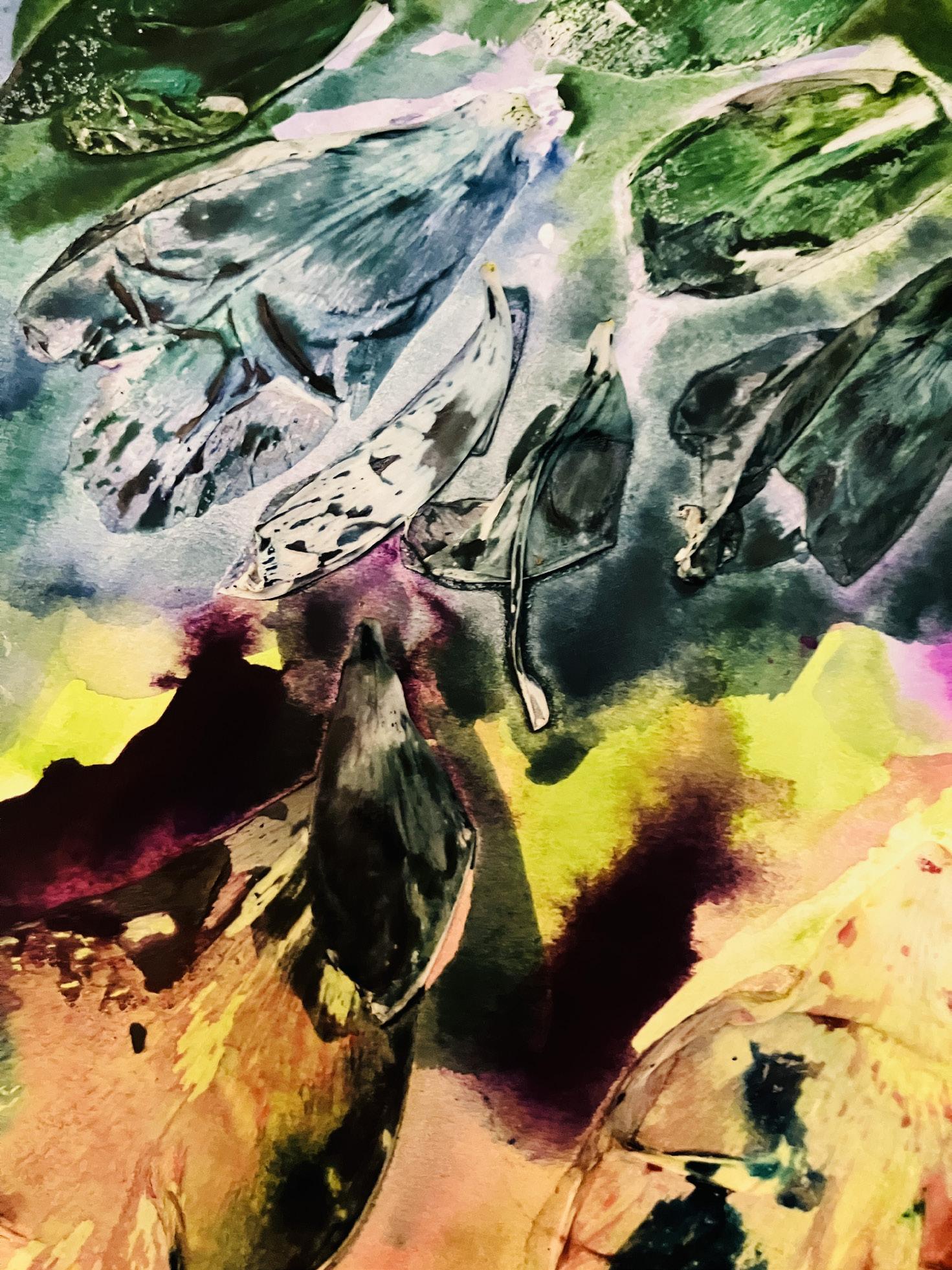


Kaviya Dhir
The Brazilian sun sizzles in May. Rio kisses my mother’s springtime cheeks as she waddles through Ipanema’s stony seashell beaches.
“Tota tola! ” she erupts, sea salt air hugging her sausage-link arms. She itches and she aches, whines—she meant Coca-Cola, bubbling and murky, plunged cap-deep into the sand.
The Brazilian mainland cooked her hair, the lineage she held in her thicket of curls, lightened by the sun’s glimmering peach.
Insistent years have tightened her honey skin, dyed her roots orange from naive brown. They have pierced her ears, patted her shins, sheathed her thighs in indigo denim. Though she sounds like a woman, she’s only eight . . . a girl rooted in Brazil, shipped to Maine to be Americanized, never to step foot on Brazilian soil again.
*
When the frosty pearl inside the moon dusks in all its midnight glory, I emerge from nine months of warmth and evolution, my autumn cheeks sprouting tulips of blush. I am born
a Texan from my mother’s trudge through life’s tangled branches, life’s ambivalent mud, just so I could utter proud names spreading their clouds across America, greeting adults eloquently, tightening baby fat. I am guided, hand-held, through the glass halls of childhood, my future reflected. I am wide-eyed. Naivete peppers my forearms with my mother’s same freckles—only my mother got hers from the sun.

Stephanie Reddoch
And the sun is too high in the sky, they’re already dead. Five, ten— no, twenty-seven earthworms scattered across the stone patio.
Moisture evaporating invisibly, wicking away what the worms need to breathe. Why risk their lives straying too far from their terrestrial home? Their desiccated bodies leave behind Hiroshima imprints, shadow stains on hard surfaces where the wife sweeps them off the patio. Ghosts, until the next shower washes them away.
Outside on wet evenings, the wife’s flashlight searches for them, drifters inching along asphalt, walkways, and terraces. And when she takes the dogs out in the early hours, when beads of water still cling to grass, she picks up the wayward Lumbricus terrestris, slick and shiny, between forefinger and thumb, then cups them in the nest of her palm. Their cool, dewy bodies wriggle and curl into themselves as she places them under trees and on moist soil between garden kale and string beans. She knows they can survive in water for several days, but it’s a race to return them home before the sun rises. Prevent suffocation as the rhythmic contractions and relaxations of their five hearts slowly stop.
Inoperable. This is what the cardiologists said of her husband’s misfiring heart. Frenetic beats or sputters come and go, but his symptoms niggle their way into her thoughts. She imagines them, husband and wife, as earthworms. Living stress-free beneath the leaves of maple, ash, and birch. Burrowed underground, nibbling bits of decaying roots and leaves, bacteria and fungi. Decomposing forest litter. Perhaps over a dinner of raccoon tartare, they’re reminded of life’s fickle clock. Let’s travel, he says. Climb new lands, feel foreign textures along our tubular bodies! The wife shivers. Shouldn’t we stay away from the sun? But her husband has a way with his bristles and tickles her saddle, easing the tension. And when he nuzzles her dorsal skin and whispers that they could make love in the gentle rain, she agrees.
Vibrations cue the perfect evening, when rain’s drumbeat pitter-patters their roof. The worms’ segments contract and elongate, setae propelling them to the surface where a waterpark awaits. And they ride and ride on the
Slip ‘N Slide to great heights and distances before they slither onto patio stones.
They breathe the dewy air, feel the thump thump thump of June bug flight. I’ve always wanted to experience this, the husband tells his wife. Her tail twines around his. They coil together, bodies pressed tight, their ten hearts beating in musical syncopation. Time slows, inch by inch. The worms bask together in a shallow pool and wait for a taste of morning light.
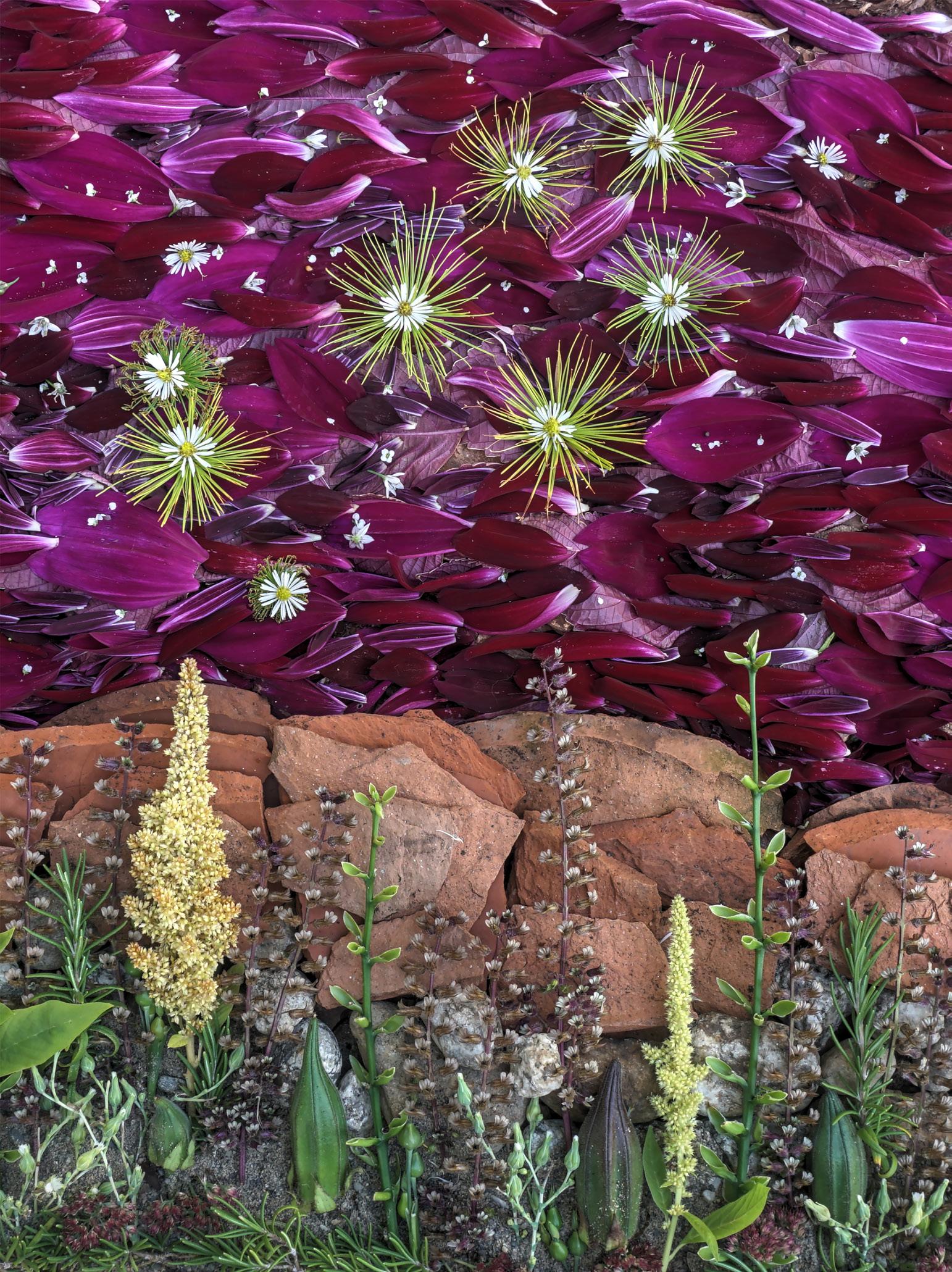


Mallie Holcomb
I.
my grandfather dies and my grandmother fixes me a tomato sandwich, offers another before I take the second bite. her kitchen’s still haunted by Ensure, liquefied pinto beans, his DNR form in a pallid egg-yolk yellow, and she hasn’t sat down in maybe three years but she apologizes for leaving the pots and pans in the cupboard today.
II. stood up on the podium, a pastor who never met him in his garden-growing days lists his life off like a script.
if I had known it’d be so distant I could’ve written her a poem instead, a requiem for the man with a squinted sunbeam smile cupping a prized tomato in both hands. for the tobacco-scented man with scratchy cheeks calling up to us kids in the magnolia tree, teaching us to eat muscadines and raw corn still sun-warm, and pushing us on the rope swing. neither eulogy would tell you she married her first husband at fifteen and left him in Alaska to drink himself dead, caught a sober man and mothered him for the rest of his life. worked six days a week at the Hanes factory, cooked and cleaned so he could be the guy who read the Bible three times and coached Little League.
III.
we had to lay the back car seats down just to fit all the sympathy, carry pots and vases inside by the armful. but standing in her doorway before the fireplace swathed in lilies she says “there ain’t hardly any flowers,” overlooks the cards till we read them aloud.
she nursed a man to death in the comfort of his recliner, but all she got from sacrifice was sacrifice.
a martyr’s lot is still just roses, a bad hip, and her husband in an urn.

Sneha Subramanian Kanta
You don’t see Sindh in my surname. Not the vicissitudes of migration through algae-green or sky-blue oceans. Let me tell you a story in three parts— The first part burgeons from my mother. The second from my father. The last is sprouting from me. Listen.
My mother tongue is history. In Karachi, my nani is still a young girl climbing wide rooftops while a British viceroy partitions India – Pakistan using outdated maps. Cartography turns in on itself like plaits. A conch shell separated, both parts holding same oceanic sound.
In five weeks, a border is drawn and a new map exiles families. A forced migration through ships, where she watches the harbor being left—enters the smoky coast of Bombay. Years later, on the brink of the Arabian Sea, meets Nana. Years later, I will say, “A love story to recount to my grandchildren.”
At the touch of dawn, love enters our life like an omnipresent god.
Nana chants bhajans in Marathi, a hibiscus in his hand. Fisherfolk songs on his tongue. The ocean from which Nani arrives here is his sustenance. The border between Sindh and Maharashtra appears like an asterism. We walk among the carpet of gulmohar in elongated lanes where women dream of weaving mogras into ancestral realms. My mother speaks in five languages and dreams in three. After her physical death, to the world she will be a body. In the depths of a forest I pass through in another country, she will still be the first word I utter when languageless. She says she would visit me as a bird and I hear birds fly in the first spring of a new year under the escarpment. There is no constriction after death. She is still dreaming.
My father tongue is the silence of God. As a boy, a schoolbag on his shoulders, my father walks through paddy fields of dawn mist. He recites English alphabets and prays in Tamil. When I close my eyes, I hear him pouring puffed rice into his siblings’ plates. Thatha and Patti are a steady river current across all of Tamil Nadu. Their last residence is near the Bhavani. I will remember this river as a place we go to pray for our dead.
My father is learning the cartography of water travelling to another
shore. When he will first arrive in Mumbai, it will be a day of torrential rain. In an expanse of mountains, my father remembers his childhood, the place we run toward our entire lives. As I pick young coconut shells slowly littering the ground, he intently studies their fragmentations. Every miracle is a design in the shape of God. At night we pray for our bones to hold onto life while listening to rain.
My languages are inherited. Words speckle like the yearnings of a constellation rebirthing itself through an arrangement in the pyrocumulus where stars burnish ridgelines remnant from gloam. When my eyes open, the first word is in English.


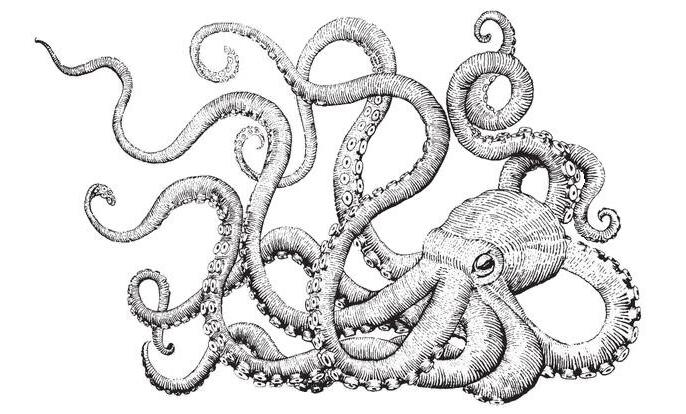
Prosper C. Ìféányí writes from Lagos, Nigeria. He won the 2023 Flapper Press Ekphrasis Poetry Contest and was a finalist for the 2024 Greg Grummer Poetry Prize from Phoebe Journal; his works are featured or forthcoming in The Offing, Salt Hill Journal, Obsidian, ANMLY, Black Warrior Review, Lolwe, Uncanny Magazine, Denver Quarterly, New Delta Review, the Oxonian Review, 20.35 Africa, and elsewhere.
Melissa A. Chappell is an ordained minister of the ELCA. She writes prolifically, and her poetry has appeared in Dreich Magazine, The Adelaide Literary Magazine, BlazeVox, and The Orchards Poetry Review. Chappell has published several books, the latest being Remnant Day (Transcendent zEro Press, 2023). Chappell also recently published a book review for Mother Wind, by Susannah Winters Simpson (Rhino Poetry Review, Nov. 2024).
Nikoletta Gjoni is a writer living outside of Washington, D.C. Her work has appeared in the 2023 Rising Stars London Independent Story Prize anthology and has been previously nominated for the PEN/Robert J. Dau prize, Best of the Net, and Best Microfiction. She is currently at work on her first novel. View Gjoni’s publications at www.ngjoni.com or follow her on Twitter @ NikiGjoni.
Christian Hanz Lozada aspires to be like a cat: a creature that doesn’t care about the subtleties of others and who will, given time and circumstance, eat their owner. He wrote the poetry collection He’s a Color, Until He’s Not. His Pushcart Prize–nominated poetry has appeared in journals from California to Australia with stops in Hawaii, Korea, and Europe. Christian has featured at the Autry Museum and Beyond Baroque. He lives in San Pedro, CA, and uses his MFA to teach his neighbors and their kids at Los Angeles Harbor College.
Born and raised in Beijing, Chen Zhongzhi is currently a third-year MFA student in Creative Writing at Emerson College. He writes poetry and fiction in both Chinese and English.
Adina Polatsek is a writer from Houston, Texas. She is currently studying at the University of Texas at Austin and was the runner-up for the 2023 James F. Parker Prize in Fiction. She has poetry and fiction published with Jet Fuel Review, Apricity Magazine, Verklempt!, Soundings East Magazine, Welter, Barzakh Magazine, Hothouse, The Oakland Review, Ligeia Magazine, The Orchards Poetry Journal, Figure 1, The Talon Review, MSU Roadrunner Review, Wayne Literary Review, Avalon Literary Review, and Last Leaves Magazine.
Diane Callahan strives to capture her sliver of the universe through writing fiction, nonfiction, and poetry. Her YouTube channel, Quotidian Writer, provides practical tips for aspiring authors. You can read her work in Consequence, The Fieldstone Review, Visitant, The Sunlight Press, The Interpreter’s House, and Kissing Dynamite, among others.
Alex Dodt is a writer from Phoenix currently working on his first poetry collection. His work has appeared in Ghost City Review, Stoneboat Journal, Barely South Review, and others.
Cliff Travers is a visual artist and writer living in Portland, Maine. His work has been featured in multiple literary magazines and anthologies, and his collection of linked stories, The Stones of Riverton, was published by Down East Books in September of 2023. Cliff received his MFA in creative writing from Stonecoast at the University of Southern Maine. He teaches creative writing at Writerfest in New York, The Writing Center in Gloucester, Massachusetts, Maine Writers and Publishers Association, and Maine Media.
Kelly Granito is a poet and public education researcher from Michigan. Her poetry has been or will soon be featured in The Louisville Review, Iron Horse Review, Gramercy Review, Burrow Press, Midwestern Gothic, Santa Clara Review, 3288 Review, Noctua Review, The Laureate, and elsewhere.
Brian Chan is a Chinese-American writer from New York. You can find his work published or forthcoming in Beaver Magazine, SUNHOUSE Literary, The Shore, and other publications. He cherishes his family, reading poetry, and red pandas.
Sophie Hoss loves the ocean and is in bed by nine every night. She has received a Pushcart Prize, and her fiction and poetry can be found in BOMB, The Baffler, Split Lip, The LA Review, Wigleaf, and elsewhere. Her chapbook, Little Divinities, was published with New American Press. Also, she has a small dog named Elmo who likes to wear little sweaters. You can read more of her work at sophiehosswriting.com.
Shou Jie Eng is a writer and architectural designer. Originally from Singapore, he runs Left Field Projects, a multi-disciplinary practice located in Hartford, Connecticut. His writing has appeared or is forthcoming in The Los Angeles Review, Tupelo Quarterly, Posit, Gaudy Boy’s anthology New Singapore Poetries, and elsewhere. He was a finalist for the 2024 Kenyon Review Poetry Contest and teaches courses on drawing and representational topics at the Rhode Island School of Design.
Melody Wilson is a pushcart-nominated poet whose poems appear in VerseDaily, West Trade Review, Crab Creek Review, San Pedro River Review, Watershed, and elsewhere. She is pursuing her MFA at Pacific University. Find more of her work at melodywilson.com.
Annie Przypyszny is a poet from Washington, DC, pursuing an MFA in Poetry at the University of Maryland. She has poems published or forthcoming in Bear Review, Jet Fuel Review, Sugar House Review, Tampa Review, Atticus Review, Tupelo Quarterly, The Main Street Rag, Beltway Poetry Quarterly, The Champagne Room, The MacGuffin, Cider Press Review, and others.
Benjamin S. Evans is a poet and author who resides in the Midwest. His half-digested failures of imagination can be found at patreon.com/benjaminsevans.
Kaviya Dhir is a student poet based in Texas. Kaviya is a junior in high school and her work has been recognized by Georgetown University and the National Scholastic Art & Writing Awards. She was recently named a finalist for the 2024–2025 Houston Youth Poet Laureate designation.
Stephanie Reddoch is a retired educator. Her work has appeared or is forthcoming in The Pinch, Jimson Weed, Grain Magazine, and elsewhere. She
lives in rural Eastern Ontario with her husband and menagerie of rescued animals. You can find Stephanie on X @brut11.
In 2020 Mallie Holcomb received a bachelor’s in English from University of North Carolina Asheville where she was awarded the Topp-Grillot Scholarship for strongest student of poetry and the Virginia Bryan Award for best senior thesis. Her poetry has appeared in Headwaters and Just Poetry. Lately, she has been working in libraries, practicing yoga, and testing the veracity of the statement “We publish both established and emerging poets.”

